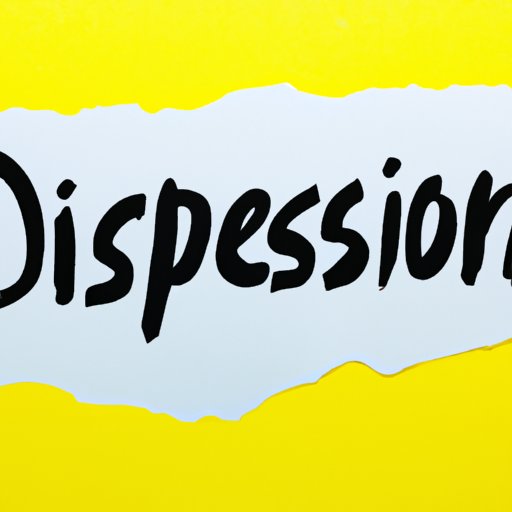
I. Introduction
Stress and depression are two of the most common mental health issues people face, and they often go hand in hand. While not everyone who experiences stress will develop depression, stress can contribute to the development of this serious mental health disorder. In this article, we will explore the link between stress and depression and offer tips and suggestions for protecting your mental health in the face of stress.
II. The Link Between Stress and Depression: What Science Says
A growing body of research has shown that there is a clear connection between stress and depression. Studies have found that people who experience chronic stress are more likely to develop depression than those who experience stress only occasionally or not at all. In addition, research has shown that stress can actually change the structure of the brain, leading to an increased risk of mental health issues.
III. 5 Ways That Stress Can Lead to Depression
There are many different ways in which stress can lead to depression. Here are five pathways through which this process can occur:
- Disrupting Brain Chemistry: Prolonged stress can disrupt the delicate balance of chemicals in the brain that regulate mood, leading to an increased risk of depression.
- Impact on Body Systems: Chronic stress can lead to immune system changes, inflammation, and other physical changes that can contribute to the development of depression.
- Negative Thoughts and Beliefs: Stress can cause negative thinking patterns, rumination, and self-doubt, which can contribute to the development of depression.
- Lifestyle Factors: Stress can disrupt sleep, appetite, exercise routines, and other lifestyle factors that play a major role in mental health.
- Contributing to Trauma: Stress can exacerbate trauma and make it more difficult for people to overcome the negative emotions and experiences associated with these events.
IV. The Hidden Impact of Stress on Our Mental Health
Beyond depression, stress can have a significant impact on our mental health in other ways. Chronic stress can lead to anxiety, panic attacks, PTSD, and other mental health conditions. In addition, stress can have physical symptoms that may be mistaken for an underlying medical condition, such as headaches, stomach issues, or muscle tension.
It’s important to recognize the impact that stress can have on our mental health, as it can help us take steps to mitigate the damage.
V. Can Stress Really Lead to Depression? Here’s What You Need to Know
The connection between stress and depression is not without controversy. Some argue that stress may simply be a trigger for pre-existing mental health issues, rather than a direct cause of depression. However, research has shown that stress can, in fact, contribute to the development of depression.
That said, it’s important to recognize that not everyone who experiences stress will develop depression, and there are many factors that contribute to mental health issues. However, understanding the role that stress can play in our mental health can help us take steps to protect ourselves.
VI. How Changing Your Response to Stress Can Prevent Depression
One of the most important things we can do to protect our mental health in the face of stress is to learn effective stress management techniques. From mindfulness meditation to exercise to therapy, there are many ways to reduce the impact of stress on our lives.
Learning new coping strategies can help you respond to stress in healthier ways, reducing your risk of developing depression or other mental health issues.
VII. The Dangerous Cycle of Stress and Depression: Breaking It With Self-Care
Stress and depression can create a vicious cycle, where stress leads to depression, which then exacerbates stress and perpetuates the problem. Self-care is crucial to breaking this cycle.
Self-care can involve anything that helps you feel more relaxed, supported, and calm. This might include spending time with loved ones, engaging in hobbies and activities you enjoy, or simply taking time for yourself to rest and recharge.
VIII. Understanding the Connection Between Stress and Depression: What You Can Do to Protect Your Mental Health
To protect your mental health in the face of stress, it’s important to take care of yourself in the following ways:
- Practice stress management techniques, such as exercise, meditation, or therapy
- Take care of your physical health, including eating well and getting enough sleep
- Build strong social connections with loved ones, coworkers, or friends
- Engage in activities you enjoy and that help you feel relaxed and supported
- Recognize the impact of stress on your mental health and seek help when you need it
IX. Conclusion
Stress and depression can be difficult to manage, but by understanding the connection between these two issues, we can take steps to protect our mental health and reduce our risk of developing depression. By practicing self-care, seeking support when we need it, and learning effective stress management techniques, we can improve our overall quality of life and protect our mental health.




